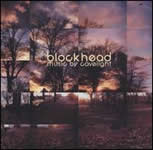|
|
 |
Dusted Reviews
Artist: Blockhead Album: Music By Cavelight Label: Ninja Tune Review date: Apr. 18, 2004 |

|
|
|
 |
Blockhead is probably best known for his excellent and unconventional production on Aesop Rock's Labor Days (has the bassoon ever been used so convincingly on a hip hop record?). Whether the real feat was the album's thematic and atmospheric structure or the figure-ground relationship of hyperliterate rhymes and baroque backdrops, it worked on a level that remains unsurpassed by either collaborator. Blockhead's solo debut Music By Cavelight may well (and deservingly) move him out of Aesop's shadow into the luminous underworld of instrumental hip hop, but it's not as interesting as it could and probably should be.
Cavelight is likable as an album, in the sense that it often finds worthwhile grooves and almost never actively offends, but it depends on a limited group of strategies which begin to sound monotonous and interchangeable early on. Most tracks have some scratching (not even by Blockhead but by the generally capable DJ Omega One) and many have severed vocal samples. The beats, though effective, are seldom complex, and the bassline is usually sinister, with some cheese thrown in for good measure. The songs have the collage quality of DJ Shadow's work (especially "Sunday Seance") and seem to take well-meant cues from Rjd2 (especially "You've Got Maelstrom"), but lack the meticulousness and unpredictability that made Endtroducing..... and Deadringer so exciting.
Cavelight does get better toward the end, from the pleasantly jazz-inflected "Triptych Pt. 2" (parts 1 and 3 of which feature irritating uses of vocal pitchshifting) to the Headhunters mock-up "Jet Son" and the Fight Club-ready "Bullfight In Ireland." Unusual moments emerge the way they did on Labor Days – sitars not guitars, and the like – and the album improves noticeably as a result. Even "Insomniac Olympics," a by-the-book lament of driving percussion and funereal horns, is convincing enough to earn its place as last song/first single.
Nonetheless, the feeling remains that something is missing, be it the presence of an MC or the more human flourishes that Blockhead's innumerable contemporaries employ. It seems that his earlier tracks, produced with the intent of being subservient to lightning-fast lyrics, still have more exciting elements than most of these do. (To wit, a bonus second disc comes with some editions of the CD featuring nothing but instrumentals from Aesop Rock albums.) Cavelight is agreeable for background music and lackluster for a hip hop album.
By Daniel Levin Becker
|







